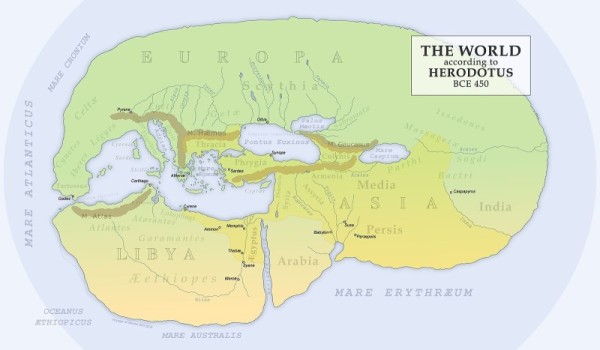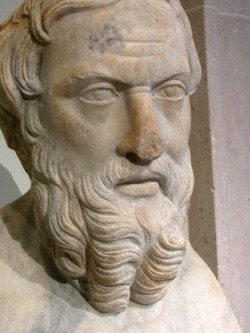I wonder then at those who have parted off and divided the world into Libya, Asia, and Europe, since the difference between these is not small; for in length Europe extends along by both, while in breadth it is clear to me that it is beyond comparison larger. . .

Translated by George C. Macaulay — our special project presenting the complete Herodotus with URLs for all of those people, places, events, and things which baffles and discourages modern readers.
Previously on Herodotus
39. This then is one of the peninsulas, and the other beginning from the land of the Persians stretches along to the Erythraian Sea, including Persia and next after it Assyria, and Arabia after Assyria: and this ends, or rather is commonly supposed to end, at the Arabian Gulf, into which Darius conducted a channel from the Nile. Now in the line stretching to Phoenicia from the land of the Persians the land is broad and the space abundant, but after Phoenicia this peninsula goes by the shore of our Sea along Palestine, Syria, and Egypt, where it ends; and in it there are three nations only.
40. These are the parts of Asia which tend towards the West from the Persian land; but as to those which lie beyond the Persians and Medes and Saspeirians and Colchians towards the East and the sun rising, on one side the Erythraian Sea runs along by them, and on the North both the Caspian Sea and the River Araxes, which flows towards the rising sun: and Asia is inhabited as far as the Indian land; but from this onwards towards the East it becomes desert, nor can any one say what manner of land it is.
41. Such and so large is Asia: and Libya is included in the second peninsula; for after Egypt Libya succeeds at once. Now about Egypt this peninsula is narrow, for from our Sea to the Erythraian Sea is a distance there of ten myriads of fathoms, which would amount to a thousand furlongs; but after this narrow part, the portion of the peninsula which is called Libya is, as it chances, extremely broad.

CC BY-SA 2.0 image from Wikipedia.
42. I wonder then at those who have parted off and divided the world into Libya, Asia, and Europe, since the difference between these is not small; for in length Europe extends along by both, while in breadth it is clear to me that it is beyond comparison larger; for Libya furnishes proofs about itself that it is surrounded by sea, except so much of it as borders upon Asia; and this fact was shown by Necos king of the Egyptians first of all those about whom we have knowledge. He when he had ceased digging the channel which goes through from the Nile to the Arabian gulf, sent Phoenicians with ships, bidding them sail and come back through the Pillars of Heracles to the Northern Sea and so to Egypt. The Phoenicians therefore set forth from the Erythraian Sea and sailed through the Southern Sea; and when autumn came, they would put to shore and sow the land, wherever in Libya they might happen to be as they sailed, and then they waited for the harvest: and having reaped the corn they would sail on, so that after two years had elapsed, in the third year they turned through the Pillars of Heracles and arrived again in Egypt. And they reported a thing which I cannot believe, but another man may, namely that in sailing round Libya they had the sun on their right hand.
43. Thus was this country first known to be what it is, and after this it is the Carthaginians who make report of it; for as to Sataspes the son of Teaspis the Achaimenid, he did not sail round Libya, though he was sent for this very purpose, but was struck with fear by the length of the voyage and the desolate nature of the land, and so returned back and did not accomplish the task which his mother laid upon him. For this man had outraged a daughter of Zopyros the son of Megabyzos, a virgin; and then when he was about to be impaled by order of king Xerxes for this offence, the mother of Sataspes, who was a sister of Darius, entreated for his life, saying that she would herself lay upon him a greater penalty than Xerxes; for he should be compelled (she said) to sail round Libya, until in sailing round it he came to the Arabian gulf. So then Xerxes having agreed upon these terms, Sataspes went to Egypt, and obtaining a ship and sailors from the Egyptians, he sailed to the Pillars of Heracles; and having sailed through them and turned the point of Libya which is called the promontory of Soloeis, he sailed on towards the South. Then after he had passed over much sea in many months, as there was needed ever more and more voyaging, he turned about and sailed back again to Egypt: and having come from thence into the presence of king Xerxes, he reported saying that at the furthest point which he reached he was sailing by dwarfish people, who used clothing made from the palm-tree, and who, whenever they came to land with their ship, left their towns and fled away to the mountains: and they, he said, did no injury when they entered into the towns, but took food from them only. And the cause, he said, why he had not completely sailed round Libya was that the ship could not advance any further but stuck fast. Xerxes however did not believe that he was speaking the truth, and since he had not performed the appointed task, he impaled him, inflicting upon him the penalty pronounced before. A eunuch belonging to this Sataspes ran away to Samos as soon as he heard that his master was dead, carrying with him large sums of money; and of this a man of Samos took possession, whose name I know, but I purposely pass it over without mention.
– Herodotus, Book IV
| <—Previous | Master List | Next—> |
Herodotus made his living by being interesting. In a world where most people did not read and could not afford to buy a book even if they could, they would pay to listen to Herodotus recite from his books. They would not pay to be bored. In that world, the names that populate his stories would have some general familiarity to his audience. Their obscurity to us is a barrier that this series seeks to break down.
MORE INFORMATION
MAP LIBRARY
Because of lack of detail in maps as embedded images, we are providing links instead, enabling readers to view them full screen.

Leave a Reply
You must be logged in to post a comment.